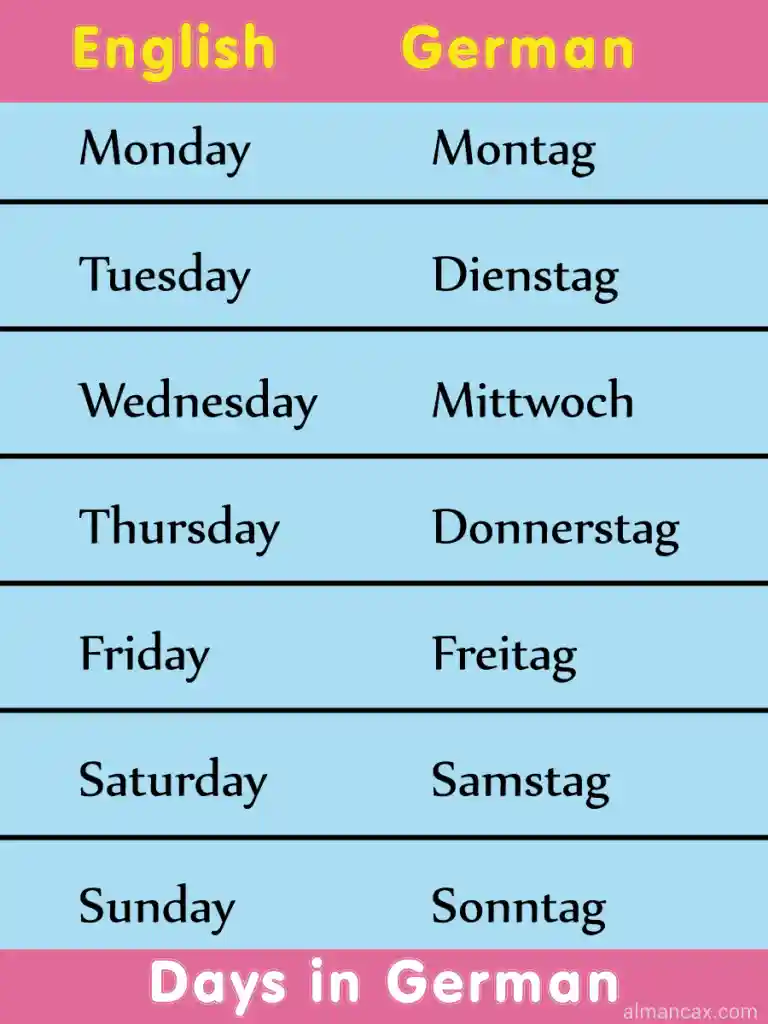Day names in German, like in many languages, have historical and cultural significance, often rooted in the Germanic and Norse traditions. German day names reflect the influence of both Christian and pagan traditions, with some names derived from gods in Germanic mythology and others from Latin or Christian origins. Understanding the origins and meanings of these names provides insight into the linguistic and cultural heritage of the German-speaking world.

Montag (Monday)
The German word “Montag” is derived from the Latin phrase “Dies Lunae,” meaning “day of the moon.” This corresponds to the English name “Monday,” which also traces its origins to the moon. In Germanic mythology, Monday was associated with the god Mani, who was believed to ride across the night sky in a chariot drawn by horses, guiding the moon.
In many Germanic languages, including English, Monday is also named after the Moon. The Germanic peoples traditionally considered Monday as the second day of the week, following Sunday.
Expressions related to Monday in German include “einen guten Start in die Woche haben,” meaning “to have a good start to the week,” which is a common wish exchanged between colleagues or friends on Mondays.
Dienstag (Tuesday)
“Dienstag” comes from the Old High German word “Ziestag,” meaning “day of Ziu.” Ziu, or Tyr in Norse mythology, was the god of war and the sky. In Latin, Tuesday was called “Dies Martis,” named after the god of war, Mars. The connection between war and Tuesday may stem from the belief that battles fought on this day would be successful.
Dienstag, the German word for Tuesday, is derived from the Old High German word “dīnstag,” which translates to “Tiw’s day.” Tiw, or Týr in Norse mythology, was a god associated with war and justice. Tuesday, therefore, is named after this deity. In Germanic mythology, Tiw is often equated with the Roman god Mars, further solidifying the association of Tuesday with war and battle.
Mittwoch (Wednesday)
“Mittwoch” literally means “mid-week” in German. In Norse mythology, Wednesday is associated with Odin, the chief god and ruler of Asgard. Odin was also known as Woden, and the English name “Wednesday” is derived from “Woden’s day.” In Latin, Wednesday was referred to as “Dies Mercurii,” honoring the messenger god Mercury.
In Germanic mythology, Wednesday is associated with the god Odin (Woden), who was revered for his wisdom, knowledge, and magic. Therefore, Wednesday is sometimes referred to as “Wodensday” in English, and the German name “Mittwoch” maintains this connection.
Donnerstag (Thursday)
“Donnerstag” translates to “Thor’s day” in German. Thor, the god of thunder and lightning, was a prominent figure in Norse mythology and was associated with strength and protection. In Latin, Thursday was called “Dies Iovis,” named after the Roman god Jupiter, who shared attributes with Thor.
Freitag (Friday)
“Freitag” means “day of Freyja” or “Frigg’s day” in German. Freyja was a goddess associated with love, fertility, and beauty in Norse mythology. Frigg, another Norse goddess, was associated with marriage and motherhood. In Latin, Friday was referred to as “Dies Veneris,” named after Venus, the goddess of love and beauty.
In German culture, Friday is often celebrated as the end of the workweek and the beginning of the weekend. It is a day associated with relaxation, socializing, and leisure activities.
Samstag (Saturday)
“Samstag” is derived from the Hebrew word “Sabbat,” which means “Sabbath” or “day of rest.” It corresponds to the English name “Saturday,” which also has its roots in the Sabbath day. In many German-speaking regions, Saturday was traditionally considered a day for rest and religious observance.
Saturday in German is called either Samstag or Sonnabend, depending on the region. Both terms have their origins in Old High German. “Samstag” is derived from the word “sambaztag,” meaning “assembly day” or “gathering day,” reflecting the day’s historical significance as a day for markets or communal gatherings. “Sonnabend” is derived from “Sunnenavent,” meaning “evening before Sunday,” which highlights Saturday’s position as the day preceding Sunday.
In German culture, Saturday is often seen as a day for relaxation, recreation, and social activities. It is the traditional day for shopping, errands, and spending time with family and friends.
Sonntag (Sunday)
“Sonntag” means “day of the sun” in German. In Latin, Sunday was called “Dies Solis,” honoring the sun god, Sol. Sunday has long been associated with worship and rest in Christian tradition, as it commemorates the day of Christ’s resurrection. It is often considered the most important day of the week for religious observance and family gatherings.
In German culture, Sunday is often considered a day of rest, relaxation, and reflection. It is traditionally a day for religious observance, family gatherings, and leisure activities. Many businesses and shops are closed on Sundays, allowing people to focus on personal and social pursuits.
Historical and Cultural Significance
The names of the days of the week in German reflect a blend of ancient Germanic, Norse, Latin, and Christian influences. These names have evolved over centuries, reflecting changes in language, religion, and cultural practices. Understanding the origins of these names provides insights into the beliefs, values, and traditions of the German-speaking peoples throughout history.
Linguistic Analysis
The German names for the days of the week demonstrate the linguistic evolution of the German language. Many of these names have cognates in other Germanic languages, such as English, Dutch, and Swedish, reflecting their common linguistic roots. By examining the etymology and phonetics of these names, linguists can trace the historical development of the German language and its connections to other languages.
Cultural Practices and Traditions
The names of the days of the week have cultural significance beyond their linguistic roots. In many German-speaking regions, certain days of the week are associated with specific cultural practices and traditions. For example, Saturday is often a day for leisure activities, social gatherings, and outdoor excursions, while Sunday is reserved for religious observance and family time. Understanding these cultural practices provides insight into the daily lives and routines of people in German-speaking countries.
Literary and Folkloric References
The names of the days of the week appear frequently in literature, folklore, and mythology. Writers and poets throughout history have drawn inspiration from these names to create evocative imagery and symbolism in their works. For example, the Norse god Odin, associated with Wednesday, features prominently in Scandinavian sagas and myths. By exploring these literary and folkloric references, scholars gain a deeper understanding of the cultural significance of the days of the week in German-speaking countries.
Modern Usage and Adaptations
While the traditional names of the days of the week remain in use in modern German, there are also variations and adaptations that reflect contemporary language and culture. For example, in informal speech and writing, it is common to use abbreviations or nicknames for the days of the week, such as “Mo” for Montag or “Do” for Donnerstag. Additionally, in the age of globalization, English names for the days of the week are also widely understood and used in German-speaking countries, especially in business and technology sectors.
Conclusion:
The names of the days of the week in German carry rich historical, linguistic, and cultural significance. Rooted in ancient Germanic, Norse, Latin, and Christian traditions, these names reflect the beliefs, values, and practices of the German-speaking peoples throughout history. By studying the origins and meanings of these names, scholars gain valuable insights into the linguistic evolution, cultural heritage, and everyday life of German-speaking communities.
Germany’s special cultural days
Germany, with its rich history and cultural heritage, celebrates various traditional and modern holidays throughout the year. These German days encompass religious, historical, and seasonal festivities, each offering unique insights into the country’s customs, beliefs, and values. From Oktoberfest to Christmas markets, German Days provide a glimpse into the heart of German culture.
New Year’s Day (Neujahrstag)
New Year’s Day marks the beginning of the calendar year and is celebrated with fireworks, parties, and gatherings across Germany. Germans often engage in the tradition of “Silvester,” or New Year’s Eve, where they enjoy festive meals, watch televised concerts, and participate in street celebrations. Many also make resolutions for the upcoming year.
Three Kings’ Day (Heilige Drei Könige)
Three Kings’ Day, also known as Epiphany, commemorates the visit of the Magi to the baby Jesus. In Germany, it is celebrated with religious services and traditional customs such as the “Sternsinger,” where children dressed as the Three Kings go from house to house singing carols and collecting donations for charity.
Valentine’s Day (Valentinstag)
Valentine’s Day is celebrated in Germany much like in other parts of the world, with couples exchanging gifts, flowers, and romantic gestures. However, it is also a day for friendship, known as “Freundschaftstag,” where friends exchange cards and small tokens of appreciation.
Carnival (Karneval or Fasching)
Carnival season, known as “Karneval” in the Rhineland and “Fasching” in other parts of Germany, is a festive time of parades, costumes, and revelry. Each region has its own unique traditions, but common elements include street processions, masked balls, and satirical performances.
International Women’s Day (Internationaler Frauentag)
International Women’s Day is celebrated in Germany with events, marches, and discussions highlighting women’s rights and achievements. It is a public holiday in the capital city of Berlin, where demonstrations and rallies draw attention to issues such as gender equality and workplace discrimination.
Easter (Ostern)
Easter is a major Christian holiday in Germany, celebrated with religious services, family gatherings, and festive foods. Traditional customs include decorating eggs, baking Easter bread and cakes, and participating in Easter egg hunts. In some regions, there are also Easter bonfires and processions.
May Day (Tag der Arbeit)
May Day, or Labor Day, is observed in Germany with demonstrations, rallies, and public celebrations organized by trade unions and political parties. It is a time to advocate for workers’ rights and social justice, with speeches, concerts, and street fairs held in cities across the country.
Mother’s Day (Muttertag)
Mother’s Day in Germany is a time to honor and appreciate mothers and maternal figures. Families typically celebrate with flowers, cards, and special meals. It is also common for children to make handmade gifts or perform acts of service for their mothers.
Father’s Day (Vatertag or Herrentag)
Father’s Day in Germany, also known as Ascension Day or Men’s Day, is celebrated with outdoor excursions, hiking trips, and gatherings with friends. Men often pull wagons filled with beer and snacks, known as “Bollerwagen,” as they walk through the countryside or visit local pubs.
Pentecost (Pfingsten)
Pentecost, or Whit Sunday, commemorates the descent of the Holy Spirit upon the apostles. In Germany, it is a time for religious services, family gatherings, and outdoor activities. Many people take advantage of the long weekend to go on short vacations or attend Pentecost markets and festivals.
Oktoberfest
Oktoberfest is the world’s largest beer festival, held annually in Munich, Bavaria. It attracts millions of visitors from around the globe who come to enjoy traditional Bavarian beer, food, music, and entertainment. The festival typically runs for 16-18 days from late September to the first weekend in October.
German Unity Day (Tag der Deutschen Einheit)
German Unity Day commemorates the reunification of East and West Germany on October 3, 1990. It is celebrated with official ceremonies, concerts, and cultural events throughout the country. The day is a national holiday, allowing Germans to reflect on their shared history and identity.
Halloween
Halloween has become increasingly popular in Germany, especially among younger generations. While not traditionally a German holiday, it is celebrated with costume parties, themed events, and trick-or-treating in neighborhoods and city centers.
St. Martin’s Day (Martinstag)
St. Martin’s Day is celebrated on November 11th in honor of St. Martin of Tours. In Germany, it is a time for lantern processions, bonfires, and sharing traditional foods such as roasted goose. Children often craft paper lanterns and parade through the streets singing songs.
Advent and Christmas (Advent und Weihnachten)
Advent marks the beginning of the Christmas season in Germany, with the lighting of Advent wreaths and calendars counting down the days until December 25th. Christmas markets, or “Weihnachtsmärkte,” spring up in cities and towns across the country, offering handmade gifts, decorations, and seasonal treats.
Christmas Eve (Heiligabend)
Christmas Eve is the main day of celebration in Germany, marked by family gatherings, festive meals, and the exchange of gifts. Many Germans attend midnight Mass or participate in candlelight services to commemorate the birth of Jesus Christ.
Boxing Day (Zweiter Weihnachtsfeiertag)
Boxing Day, also known as Second Christmas Day, is a public holiday in Germany observed on December 26th. It is a time for relaxation, leisure activities, and spending time with loved ones after the hustle and bustle of Christmas Day.












